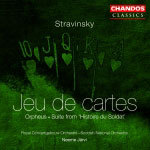
Jeu de cartes (The Card Game) / Orpheus / Suite from 'the Soldier's Tale'
 $26.00
Out of Stock
$26.00
Out of Stock6+ weeks add to cart
STRAVINSKY
Jeu de cartes (The Card Game) / Orpheus / Suite from 'the Soldier's Tale'
Royal Concertgebouw Orchestra / Scottish National Orchestra / Neeme Jarvi
[ Chandos Classics / CD ]
Release Date: Wednesday 5 May 2004
This item is currently out of stock. It may take 6 or more weeks to obtain from when you place your order as this is a specialist product.
'Järvi's 1992 coupling of Stravinsky's Jeu des cartes (still relatively rare on CD) and Orpheus was welcomed 'with open arms…' when it first appeared; he has an orchestra [the Royal Concertgebouw] capable of lightness of touch and tone without sounding undernourished and a recording balance that manages intimacy, transparency and depth… Throughout the digital recording is still in the demonstration bracket. Highly recommended.'
Gramophone
Chandos' acclaimed recordings of these popular works by Stravinsky are now available on its mid-price Classics label.
Järvi's recordings with the SNO are famous for their freshness and spontaneity, whilst his account of Jeu de cartes, with the fabled Concertgebouw Orchestra, is especially noted for its sonic brilliance.
Jeu de cartes was commissioned by Lincoln Kirstein for the American Ballet in New York in 1935. Stravinsky had for many years been toying with the idea of a ballet in which the action centred around a game of cards (a favourite pastime of the composer's). The commission was therefore a timely opportunity for him to realise his plans, for a considerable portion of the work had already been written or at least formulated in his mind. The ballet consists of three continuous deals, each prefaced with a march-like introduction representing the shuffling of the pack. The dancers are cards in a poker game which takes place against a backcloth of green baize, the progress of the game continually disrupted by the machinations of the joker.
It was Kirstein again who commissioned Orpheus in 1946. Stravinsky was interested in Greek mythology and in musical terms he perceived the work as a restrained oration on the timeless, tragic aspects of the two melancholy lovers. The scoring is delicate and the dynamics throughout are suppressed, with only one instrumental climax above the level of forte - that which accompanies the tearing to pieces of Orpheus by the Bacchantes.
The Soldier's Tale was projected as a touring-piece for the small villages of Switzerland. It draws from the collection of folk-tales by the Russian writer Afanasyev; but the hero's Faustian pact relates him to a central European tradition, and Stravinsky wanted him to be seen as 'the victim of the then world conflict' in 1918. Shorn of the drama, the Suite's instrumental pieces come across as incisive character studies, subtly embracing hints of the devilish struggle.
REVIEWS
'Järvi's 1992 coupling of Stravinsky's Jeu des cartes (still relatively rare on CD) and Orpheus was welcomed 'with open arms…' when it first appeared; he has an orchestra [the Royal Concertgebouw] capable of lightness of touch and tone without sounding undernourished and a recording balance that manages intimacy, transparency and depth… Throughout the digital recording is still in the demonstration bracket. Highly recommended.'
Gramophone
'Järvi's players give the music its full range of character and rhythmic zest.'
BBC Music Magazine
Tracks:
Jeu de cartes (The Card Game)
Orpheus
Suite from 'The Soldier's Tale'